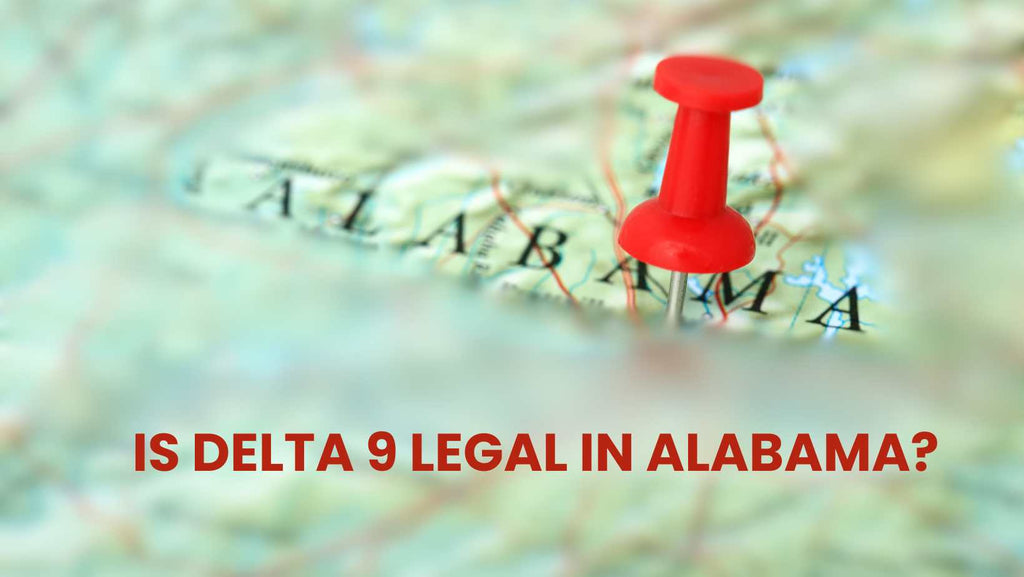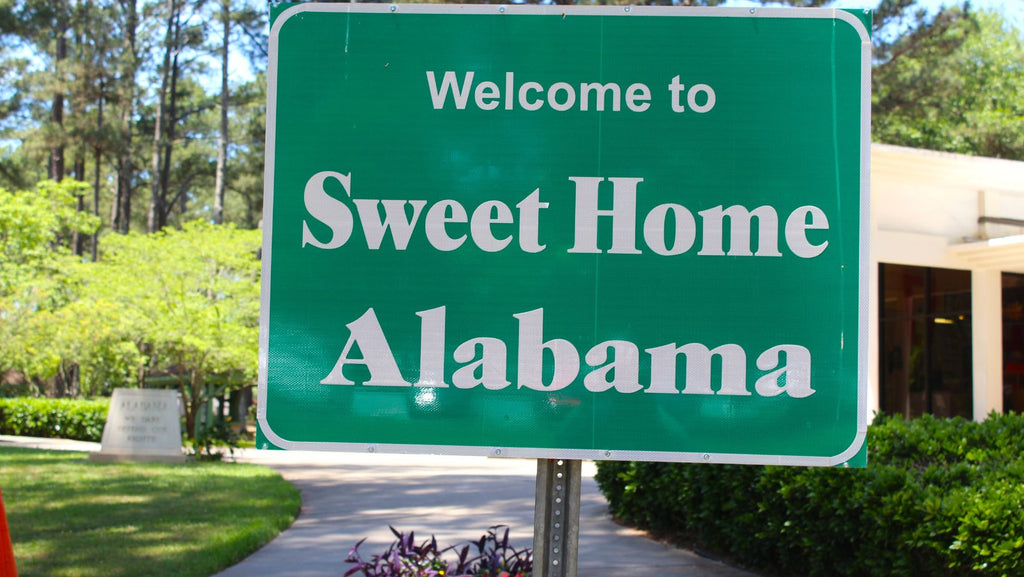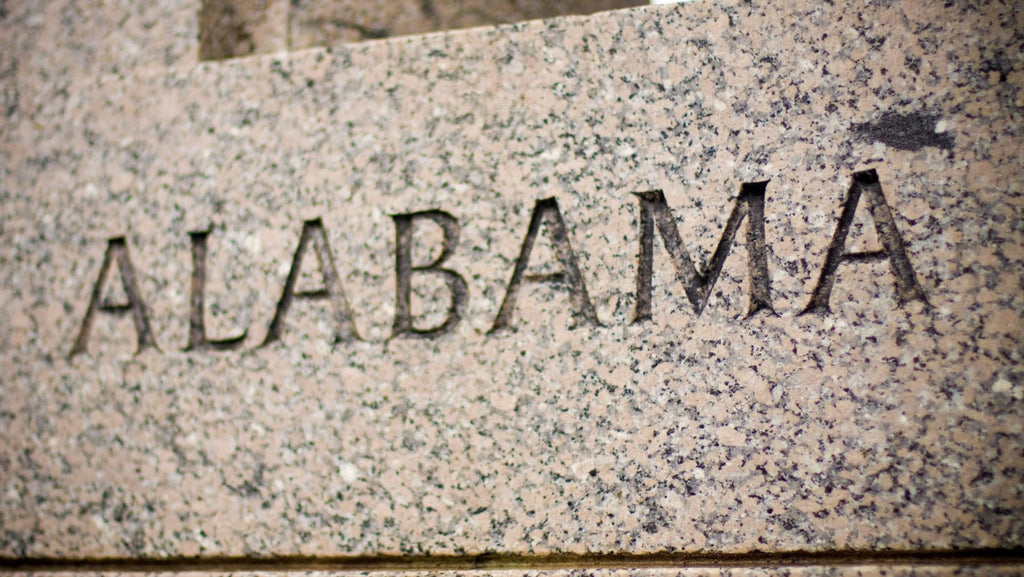
Is Delta 9 Legal in Alabama?
Explore whether Delta 9 THC is legal in Alabama, including insights into state regulations, the distinction between hemp and marijuana, and guidelines for purchasing.
Is Delta 9 Legal in Alabama?
The legality of Delta 9 in Alabama, particularly when derived from hemp, has seen significant transformations since the enactment of the 2018 Farm Bill. This pivotal legislation distinguished hemp from marijuana, thus reshaping the legal framework for hemp and its derivatives, including Delta 9 THC.
Current Legal Status of Delta 9 in Alabama
In Alabama, Delta 9 THC sourced from hemp is legal, in line with federal law established by the 2018 Farm Bill. This legislation was a milestone in cannabis law, differentiating hemp from marijuana by defining hemp as Cannabis sativa strains containing no more than 0.3% delta-9 THC on a dry weight basis.

Following this federal update, Alabama updated its laws to match the new federal standards. Notably, Section 2-8-381 of the Code of Alabama 1975 was amended to align with the Farm Bill, defining "hemp products" broadly to include all items derived from industrial hemp, such as foods, fibers, and oils.
Additionally, this section defines "hemp" or "industrial hemp" as any part of the Cannabis sativa L. plant, including its seeds and all derivatives, provided they contain a delta-9 THC concentration of no more than 0.3%. This definition has effectively legalized the cultivation, possession, and use of industrial hemp and its products, as long as they adhere to the THC limits.
Historical Context of Cannabis Laws in Alabama
Before these changes, hemp and marijuana were both categorized under the Controlled Substances Act (CSA) as illegal substances, with no distinction between them. This classification had a broad impact on agriculture and industry due to hemp's numerous uses.
The 2018 Farm Bill and Alabama’s legal adjustments mark a significant change in the state’s stance on cannabis, recognizing the economic and agricultural benefits of hemp while maintaining strict controls on marijuana.
This evolution in Alabama’s cannabis laws demonstrates a shift from rigid prohibition to a more refined policy, wherein marijuana remains illegal but hemp and hemp-derived products like Delta 9 THC are legally recognized, reflecting a changing legal and societal view towards certain cannabis forms.
Navigating Alabama's Delta 9 Cannabis Regulations
Alabama's approach to cannabis regulation is comprehensive, covering various elements related to the use, cultivation, and distribution of cannabis. It is crucial for individuals to grasp the specifics of the state's laws to effectively maneuver through this intricate regulatory environment.
Principal Elements of Alabama's Cannabis Laws
Alabama's cannabis policies primarily differentiate between medical cannabis and hemp-derived products. Here’s a breakdown of the main aspects:
Medical Cannabis Legal Framework
The introduction of the Darren Wesley 'Ato' Hall Compassion Act in 2021 marked a pivotal change in Alabama's stance on cannabis. This legislation permits the use of medical cannabis for a list of specific conditions, such as cancer, epilepsy, and chronic pain. Patients diagnosed with these conditions are eligible to use medical cannabis products upon receiving a prescription from a certified healthcare practitioner.

Regulation of Medical Cannabis Operations
The Act establishes a comprehensive regulatory system for the growth, production, and sale of medical cannabis. This system includes licensing requirements for cultivators, producers, and retailers, and imposes rigorous standards for product quality and safety.
Focus on Research and Medical Education
The law also underscores the importance of research and educational initiatives concerning medical cannabis. It supports scientific studies to explore its effectiveness and safety and requires educational programs for medical professionals.
Restrictions and Constraints
However, Alabama’s cannabis legislation comes with several restrictions:
- Restricted Medical Access: Medical cannabis access is confined to patients with specified qualifying conditions who must also register in a state-controlled patient registry.
- Prohibition of Recreational Use: The recreational consumption of cannabis remains illegal. Unauthorized possession, sale, or use of marijuana is subject to severe legal penalties.
- Regulations on THC Levels in Hemp: Legal hemp products must not contain more than 0.3% delta-9 THC. Products exceeding this limit are considered marijuana and fall under stricter cannabis laws.
- Rigorous Licensing for Cannabis Businesses: Those operating within the medical cannabis sector are subject to stringent licensing requirements aimed at ensuring product safety and quality.
- Laws Against Public Usage and DUI: Public consumption of cannabis is illegal, even if it's for medical reasons. Driving under the influence of cannabis is also illegal and subject to strict enforcement.
Shipping Delta 9 Products to & From Alabama
Shipping Delta 9 THC products like delta 9 gummies to and from Alabama involves navigating a complex legal landscape that is influenced by both state and federal laws. Under federal law, hemp-derived products containing less than 0.3% Delta 9 THC by dry weight are legal to ship across state lines thanks to the 2018 Farm Bill.
However, Alabama's state laws add another layer of complexity, as the transportation of marijuana-derived Delta 9 THC products remains illegal, given that recreational marijuana use is prohibited within the state. Businesses and consumers engaging in the shipping of hemp-derived Delta 9 products must ensure their products meet the federal threshold for THC content and comply with Alabama's strict regulations.

For those shipping Delta 9 products into Alabama, it is crucial to maintain meticulous records and ensure that all products are clearly labeled as hemp-derived and contain no more than the legally permitted level of THC. This is essential not only to avoid legal repercussions but also to ensure that the products can be distributed within Alabama without any legal ambiguity.
Understanding the nuances of these regulatory requirements can protect businesses from potential legal challenges and ensure that consumers receive products that are both safe and legal.
- Ensure Compliance with THC Limits: All products must contain less than 0.3% Delta 9 THC by dry weight.
- Maintain Accurate Documentation: Keep detailed records of product testing and compliance to verify legality.
- Label Products Clearly: Clearly label all shipments to indicate they are hemp-derived and compliant with federal and state laws.
- Understand State and Federal Laws: Stay updated on changes to laws that could affect the shipping of Delta 9 products.
- Consult Legal Experts: Seek advice from legal professionals experienced in cannabis law to navigate shipping regulations effectively.
Delta 9 Legality in Alabama vs Other States
The legality of Delta 9 THC varies significantly across the United States, with each state implementing its own set of rules and regulations. Understanding how Alabama's stance on Delta 9 compares to other states can provide insight into the broader national context of cannabis legality.
Delta 9 THC in Alabama
In Alabama, Delta 9 THC derived from hemp is legal as long as it contains no more than 0.3% THC on a dry weight basis, in line with federal law. However, marijuana-derived Delta 9 THC remains illegal for both recreational and medical use, with the state having strict cannabis laws compared to other states.
Comparison with Other States
Here’s how Alabama's laws compare to other states that have varying degrees of legality for cannabis and hemp-derived products:
- Florida: Florida has legalized medical marijuana, allowing for marijuana-derived Delta 9 THC with a doctor’s prescription. Hemp-derived Delta 9 is also legal under the 0.3% THC threshold.
- Texas: Texas allows hemp-derived Delta 9 under the 0.3% THC limit but has very restrictive medical marijuana laws that limit THC content to a low percentage, making marijuana-derived Delta 9 practically inaccessible for most residents.
- Ohio: Ohio has a comprehensive medical marijuana program that permits the use of marijuana-derived Delta 9 THC for qualified medical conditions. Hemp-derived Delta 9 is also permissible under the federal limit.
- Wisconsin: Similar to Alabama, Wisconsin permits hemp-derived Delta 9 THC products as long as they meet the 0.3% THC criterion. Unlike Alabama, Wisconsin does not have any form of legalized marijuana.
- South Carolina: In South Carolina, hemp-derived Delta 9 is legal following federal guidelines, but medical and recreational marijuana remains illegal.
- North Carolina: North Carolina permits hemp-derived Delta 9 THC products but, like Alabama, has not legalized marijuana for medical or recreational use.
Comparison Table
To provide a clearer comparison, here’s a table summarizing the legal status of Delta 9 THC in Alabama and other mentioned states:
| State | Hemp-Derived Delta 9 Legal | Medical Marijuana | Recreational Marijuana |
|---|---|---|---|
| Alabama | Yes (≤0.3% THC) | No | No |
| Florida | Yes (≤0.3% THC) | Yes | No |
| Texas | Yes (≤0.3% THC) | Limited | No |
| Ohio | Yes (≤0.3% THC) | Yes | No |
| Wisconsin | Yes (≤0.3% THC) | No | No |
| South Carolina | Yes (≤0.3% THC) | No | No |
| North Carolina | Yes (≤0.3% THC) | No |
No |
Comparing Alabama's Medical Cannabis and Hemp-Derived Delta 9 Options
Although Alabama has legalized a medical cannabis program, it is still in the early stages of implementation, which means residents are currently unable to access medical cannabis benefits. Furthermore, when the program is fully operational, it will not permit the use of smokable or edible forms of THC for medicinal purposes.
Conversely, hemp-derived Delta 9 is readily available to adults in various forms, including gummies, chocolates, vapes, and flowers. This availability provides significant relief and relaxation options for medical patients who prefer edible forms of cannabis, as well as for those who do not meet the eligibility criteria for the state’s medical cannabis program.
The chemical composition of Delta 9 from hemp is essentially identical to that derived from marijuana, ensuring that individuals in need of medical cannabis benefits but who do not have a qualifying condition can still find effective relief in Alabama.
Can You Buy Delta 9 in Alabama?
FAQs
Can I transport hemp-derived Delta 9 products across Alabama state lines?
Yes, transporting hemp-derived Delta 9 products across state lines is federally legal, but ensure they contain less than 0.3% THC.
Are there any legal penalties for possession of marijuana-derived Delta 9 in Alabama?
Yes, possession of marijuana-derived Delta 9 THC can lead to significant legal penalties, including fines and imprisonment.
Is it legal to grow hemp for Delta 9 production in Alabama?
Yes, it is legal to grow hemp in Alabama for Delta 9 production with appropriate licensing from the state’s Department of Agriculture.
Can I use Delta 9 THC for anxiety in Alabama?
While hemp-derived Delta 9 with less than 0.3% THC is legal, it should be used under the guidance of a healthcare provider.
What should I do if my hemp-derived Delta 9 product exceeds the legal THC limit?
If a product exceeds the 0.3% THC limit, it is considered illegal under Alabama law and should be disposed of to avoid legal issues.
Does Alabama allow the sale of Delta 9 edibles?
Yes, as long as the edibles contain hemp-derived Delta 9 THC within the legal THC limit of 0.3%.
Are there any efforts to legalize medical marijuana in Alabama?
There have been attempts to legalize medical marijuana, but as of now, all such efforts have failed to pass.
Can I use Delta 9 THC legally in Alabama if I have a prescription from another state?
No, prescriptions for marijuana-derived Delta 9 from other states are not recognized in Alabama, which does not have a medical marijuana program.
- Choosing a selection results in a full page refresh.

